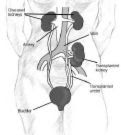- Learn all you can about kidney disease and especially your own condition. Work with your care team to find out how the information applies to you. Do what works best for you-whether it's talking to other people and asking questions, reading,
- Know that you can do this! Think of CKD as a challenge to be met head on. There are people and resources to help you become a partner in your care to help you live long and well with CKD.
- Learn about your medications, their proper dosages, names, and the purpose of each one. In some cases, medications-like certain classes of blood pressure pills-can slow the progress of kidney disease. Ask your doctor what can be done for you.
- Track your lab test values over time and learn what they mean. While your health care team knows a lot about kidney disease, you are the expert on you.
- Take charge and take action. If you don't understand something, or if something seems wrong, speak up! Talk with your doctor. Ask questions. Find out what you can do to improve your health.
- Find out the symptoms of CKD and report your symptoms to your doctor. Some problems, like fatigue, can be treated, so you have more energy and can feel your best.
- Work with your health care team to determine good dietary guidelines. Follow them as closely as possible and see how your diet affects your lab test values.
- Exercise regularly and sensibly.
- Stay employed. Even if you have to take some time off work to adjust to a new situation, try to work part-time or full-time. Keeping a job is a good way to stay active, plus your employee health insurance coverage will help pay for medical expenses that may arise.
- Do some research and planning for medical insurance and other financial considerations. Resources such as medical social workers, kidney patient organizations, Medicare and your state insurance bureau can help. Don't panic! Many resources are available to help you figure out how to manage financially or to provide help if you need it.
- Find out what your target blood pressure should be and work with your doctor to do what you must to keep it there. Research shows this can help slow the progress of kidney disease.
- If you have diabetes, blood sugar control can help slow the progress of kidney disease. If you're not sure how to improve your blood sugar control, ask your doctor for a referral to a diabetes educator.
- Be aware of the possible complications of kidney disease, including: anemia, metabolic acidosis, bone disease, cardiovascular disease, fluid overload, high potassium and phosphorus and others. Each of these can be detected with the right tests, plus there's a lot you can do to avoid the complications if you learn what to look for.
- If your kidney disease is severe, decide whether you will want to get on a transplant waiting list, or check out the possibility of a kidney transplant from a willing and suitable living donor.
- Visit a dialysis center to learn more about hemodialysis.
- If you're on dialysis, do all of the treatments your doctor orders. Work with your care team to feel your best. Monitor your Kt/V or URR (tests that measure whether your blood is being adequately cleaned) and other lab values over time; find out what to do to improve your test results, if they are not satisfactory.
- If you have a transplant, take all your medications on schedule. Watch for any signs of infection, rejection, or other illness.
- Pay attention to your emotions. Give yourself time to adjust and feel in control again. You may be dealing with uncertainty about the future or with changes in your lifestyle and relationships. It is normal to go through a period of upheaval.
- Ask for help when you need it. Talk to your family and friends, to other kidney patients, to your clergy, or to your health care team. Get the support you need.
- Cultivate your appreciation of life; do those things that are most meaningful and bring you the most joy.
Atasi Parut Jerawat
13 years ago








No comments:
Post a Comment